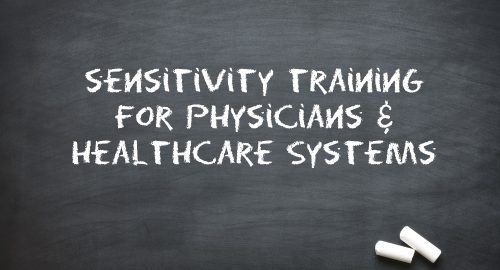
Sensitivity Training for
Physicians & Healthcare Systems
D
octors are trained extensively on how to diagnose and treat patient ailments, but little to no emphasis has been placed on effective and empathetic communication skill building. Sensitivity training for doctors and medical staff is a smart investment in reducing overall liability & complaints while improving patient satisfaction. Our training focuses on building real world, actionable skills in communication that fosters a culture of respect and harmony. We base our techniques on solid data and solutions developed by psychologists. Sensitivity training not only ensures the doctors deal with patients in an empathetic manner that creates an enhanced patient experience; it also facilitates a respectful and harassment free workplace for the physician, nurses and other hospital staff.
One of the top reasons personal relationships fail is due to poor communication. You can extend this concept to your practice – you will lose valued team members and patients if your communication skills are lacking. We focus on easy to implement techniques that convey respect, attention, and understanding; all vital elements on which patients judge a practice. Strong communication, a sense of caring and a treatment team that works together seamlessly are all vital to the patient’s welfare, and can create an iron-clad reputation for both practice and clinician.
Sensitivity Training Benefits:
- Establish a foundation for healthy interaction between staff and patients
- Reduce negative online reviews from former staff and patients
- Build strong working relationships through effective, smart dialogue
- Improve patient satisfaction, compliance, and outcomes [1][2]
- Communicate more professionally and effectively with co-workers & patients
- Reduce legal liability by documenting sensitivity training
- Learn how to sensitively approach cultural, generational, sexual orientation, religious and other differences
- Learn communication skills that can remove perceived insensitivity before it begins
- Reinforce your hospital or practice’s anti-harassment and discrimination policies
- Ensure that your policies regarding patient care are understood and followed
- Strengthen your online reputation management program
References:
1. Kelley, J. M., Kraft-Todd, G., Schapira, L., Kossowsky, J. & Riess, H. The influence of the patient-clinician relationship on healthcare outcomes: a systematic review and meta-analysis of randomized controlled trials. PLoS One 9, e94207 (2014)
2. Finset, A. 50 years of research on the effect of physician communication behavior on health outcomes. Patient Educ. Couns. 96, 1–2 (2014).
Group Sessions
Group sessions consisting of 2 hour blocks. Role playing involved, interpersonal analysis. Great to quickly address all members of an organization to keep everyone focused on building communication.Course Outline:
I. Fundamentals
Review the realities of insensitivity, discrimination and harassment
Identify the importance of sensitivity training for doctors
Participate in a sensitivity & bias assessment
Identifying special groups: gender issues, LGBTQ, cultural issues, religion, age & generational issues
Understand the importance of being sensitive to different peoples
Identify individual responsibility in preventing insensitivity or harassment
Realize how communication style can contribute to insensitivity & perceived disrespect
II. Building Communication Skills
Define what a respectful health care environment should look like in your organization
Gain an improved understanding of the right attitudes to create a respectful workplace
Learn the communication skills to succeed in a diverse healthcare environment
Incorporate respect for yourself and others as a core value
Define and explain both real and perceived insensitivity, discrimination or harassment
Identify the 10 most common patterns of insensitivity & disrespectful behavior
Develop the foundation for a sensitive and inclusive healthcare and work environment
III. Policy & Legal Review
Understand the legal liabilities of insensitivity, discrimination and harassment
Communicate & review hospital or practice anti-harassment/discrimination policies during sensitivity training for doctors
Identify state and federally protected groups
Learn the steps necessary to establish the correct workplace environment
Communicate and work more effectively with different people and personalities
Understand how communication styles can affect people’s perceptions understandings
Review courteous & respectful communication
Review courteous and respectful behavior in healthcare settings
Develop an individual action plan to increase sensitivity & respectful communication

What our clients say? all testimonials
We have used PRM for community relations for a year now, and it’s increased our new clients from physician referral by at least 10 per month.

We love our new website! Our patients say it’s easier to find us and schedule appointments online.

PRM has done an amazing job promoting our business to referring physicians nationwide, we’ve tripled our new client referrals over the past two years.

Request More Information
